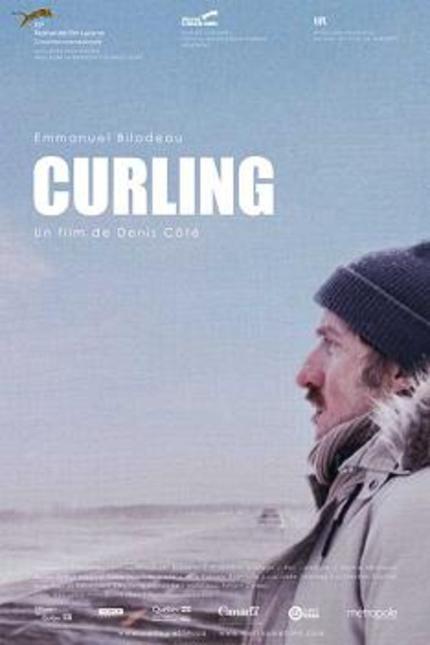CURLING review

Where Dogtooth told its story with far too much enigmatic symbolism and refused to explain any of it, Curling grounds its premise in reality and adds just enough detail to keep things relatively plausible. Where Dogtooth didn't seem to understand its lead was a monster, Curling humanises its protagonist, allows him self-awareness and even partly redeems him.
Father Jean-François (Emmanuel Bilodeau) and daughter Julyvonne (Philomène Bilodeau, his daughter in real life) clearly have issues. Withdrawn and uncommunicative, they live in an isolated house some way from the nearest city. Jean-François keeps Julyvonne on a short leash - even at twelve years old she doesn't go to school, go out or otherwise socialise with children her own age.
While it's never explicitly stated if there was one thing that tipped Jean-François over the edge, it's made clear those few people he sees from day to day find him decent, but strange. He works as a janitor and general dogsbody at a local bowling alley and motel, where his bosses consider him a good worker, but seem mystified by the distance he maintains and his lack of any real personal life.
Jean-François's world begins to fall apart first when the owner of the bowling alley takes on a young, attractive relative to work occasional shifts, and second when the old couple who run the motel decide to close up shop. Slowly but surely, he's forced to show an emotional response as people display not just bemusement or frustration with him and his daughter, but also simple human concern at the way they live their lives.
Coupled with the slow, steady pace, the way the world methodically breaks down Jean-François's defences is a running theme that pays off many times over. It's not that he's ultimately magically freed from his demons, but the constant suggestions (implied or explicit) that his vain attempts to shield Julyvonne from corrupting influences might be doing her more harm than good are clearly shown having an effect.
Emmanuel Bilodeau gives a tremendous performance, Jean-François's barely suppressed fear, self-doubt and tearful frustration made plainly visible with the slightest change of expression, posture or inflection. He clearly cares about his daughter, wants to believe he's doing the right thing by her and he's evidently a decent enough person the thought he isn't terrifies him for her sake as much as his own.
While Philomène isn't given nearly as much to do, she still makes a fantastic contribution. As the supporting cast point out, while Julyvonne is still a pleasant, friendly enough young person, she's clearly much more emotionally withdrawn than a child of that age ought to be. The younger Bilodeau manages to convey an uncomfortable, eerie lack beneath her moments of silence or placid stares. While this never equates to tension, exactly, it strongly suggests the girl's not got much of a future if Jean-François doesn't learn how to be more of a father to her.
Certainly Curling is a dark film at times. Death is a constant presence, if an enigmatic one - the events that precede the motel closing down and the lure that tempts Julyvonne into the woods near her house are never fully explained. Still, the details clearly aren't important, though there's just enough background audiences can fill in the blanks.
It does arguably get a little too enigmatic. One seemingly fairly important plot thread ends up left completely hanging without even a hint at any possible consequences, and the ending doesn't so much wrap things up as absently drift off on a vague suggestion of what might happen next. And certain scenes push the quirky indie tropes a little too hard - hearing that Tiffany song when Jean-François allows Julyvonne some music on the radio feels uncomfortably droll, the sound of Denis Côté slapping himself on the back.
Nonetheless it's hard to overstate how much of an impact placing Jean-François's skewed worldview in context has on the film. While he's done some horribly misguided things he's stopped short of locking himself and his daughter away entirely. He does still acknowledge they both need to be part of the world, however much he fears it, which gives weight to the idea there's a human being under the terrified paranoiac we see.
His eventual willingness to talk to people, or his unspoken dialogue when he talks to a normal child - silently comparing the conversation with Julyvonne - are far more deeply affecting than any amount of pushing viewers' buttons. The slow realisation the man hasn't gone over the edge just yet leads the viewer to hope against hope he'll step back, despite everything he's done.
It's a sad and disturbing film, but still gently optimistic where Dogtooth was a blunt instrument (despite its flashes of genius). Awkward and faltering, like father and daughter, Curling is still compelling, thought-provoking stuff that holds your attention with part haunting beauty, part car-crash fascination and part grudging empathy for a man who clearly wants to do the right thing. (Even if he's not sure what that is.) For those after a moving, off-the-wall epiphany Denis Côté's film comes strongly recommended.
(Curling was shown as part of the 17th Bradford International Film Festival, which ran at the UK National Media Museum in Bradford from 16th-27th March 2011.)

Do you feel this content is inappropriate or infringes upon your rights? Click here to report it, or see our DMCA policy.






